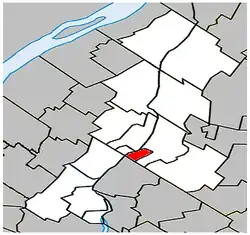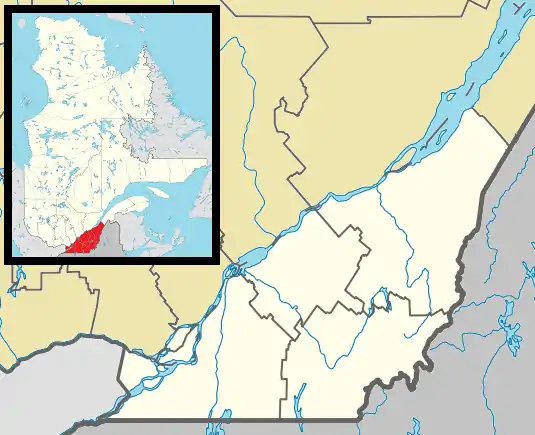Otterburn Park
Otterburn Park is a small town located 40 kilometres (25 mi) east of Montreal, Quebec, Canada. The population as of the Canada 2011 Census was 8,450. The town lies south of Mont-Saint-Hilaire on the Richelieu River and is one of the few officially bilingual towns in Quebec.
Otterburn Park | |
|---|---|
 | |
 Location within La Vallée-du-Richelieu RCM. | |
 Otterburn Park Location in southern Quebec. | |
| Coordinates: 45°32′N 73°13′W[1] | |
| Country | |
| Province | |
| Region | Montérégie |
| RCM | La Vallée-du-Richelieu |
| Constituted | July 1, 1855 |
| Government | |
| • Mayor | Mélanie Villeneuve |
| • Federal riding | Beloeil—Chambly |
| • Prov. riding | Borduas |
| Area | |
| • Total | 5.70 km2 (2.20 sq mi) |
| • Land | 5.35 km2 (2.07 sq mi) |
| Population (2011)[4] | |
| • Total | 8,450 |
| • Density | 1,580.6/km2 (4,094/sq mi) |
| • Pop 2006-2011 | |
| • Dwellings | 3,256 |
| Time zone | UTC−5 (EST) |
| • Summer (DST) | UTC−4 (EDT) |
| Postal code(s) | |
| Area code(s) | 450 and 579 |
| Highways | |
| Website | www.ville. otterburnpark.qc.ca |
History
Originally a rural agricultural area, Otterburn Park's transformation began in the late 1800s, when it became a favourite weekend destination for employees of the Grand Trunk Railway, which, starting in 1885, ran a weekend train from Bonaventure Station to Mont-Saint-Hilaire.[5] Occasional recreational visitors, including railroad employees, bought or built summer cottages, spurring development and, eventually, permanent settlement.[5]
Until 1949, the Otterburn park was a neighbourhood within Mont-Saint-Hilaire parish.[5] It took its present name, Otterburn Park, by vote in 1953.
Otterburn Park was the scene of the St-Hilaire train disaster in 1864, in which nearly 100 people were killed when an immigrant train failed to stop at an open swing bridge and fell into the Richelieu. The disaster remains the worst railroad accident in Canadian history, and the bridge is known to this day as the Pont Noir, or black bridge.
Demographics
According to the Office québécois de la langue française, Otterburn Park has been officially recognized as a bilingual municipality since 1978-04-22.[6][7]
In the 2021 Census of Population conducted by Statistics Canada, Otterburn Park had a population of 8,479 living in 3,335 of its 3,381 total private dwellings, a change of 0.7% from its 2016 population of 8,421. With a land area of 5.37 km2 (2.07 sq mi), it had a population density of 1,579.0/km2 (4,089.5/sq mi) in 2021.[8]
Education
The South Shore Protestant Regional School Board previously served the municipality.[11]
See also
References
- "Reference number 142206 in Banque de noms de lieux du Québec". toponymie.gouv.qc.ca (in French). Commission de toponymie du Québec.
- Ministère des Affaires municipales, des Régions et de l'Occupation du territoire: Otterburn Park
- Parliament of Canada Federal Riding History: CHAMBLY--BORDUAS (Quebec)
- 2011 Statistics Canada Census Profile: Otterburn Park, Quebec
- "Otterburn Park :: Portrait de la ville :: Histoire et patrimoine". Archived from the original on 2008-12-28.
- "Organismes reconnus offrant des services dans une langue autre que le français". www.oqlf.gouv.qc.ca. 2022-12-19. Retrieved 2023-04-20.
- "Municipalities across Quebec vow to keep bilingual status - Montreal | Globalnews.ca". Global News. Retrieved 2023-04-20.
- "Population and dwelling counts: Canada, provinces and territories, and census subdivisions (municipalities), Quebec". Statistics Canada. February 9, 2022. Retrieved August 29, 2022.
- Statistics Canada: 1996, 2001, 2006, 2011 census
- 2006 Statistics Canada Community Profile: Contrecœur, Quebec
- King, M.J. (Chairperson of the board). "South Shore Protestant Regional School Board" (St. Johns, PQ). The News and Eastern Townships Advocate. Volume 119, No. 5. Thursday December 16, 1965. p. 2. Retrieved from Google News on November 23, 2014.